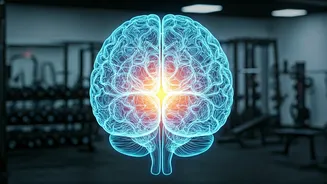Muscle Cramps & Twitches
One of the most immediate indicators of magnesium deficiency is the unwelcome presence of muscle cramps and twitches. These involuntary spasms can occur
in various muscles throughout the body, causing discomfort and occasionally disrupting daily activities. This is because magnesium is critical for proper muscle function. It aids in muscle relaxation, and when levels are low, muscles may struggle to relax normally, leading to these uncomfortable experiences. Recognizing this symptom is an important initial step in addressing a potential magnesium deficiency.
Poor Sleep or Restlessness
Magnesium deficiency can significantly affect sleep quality. Individuals with inadequate magnesium levels frequently report difficulties falling asleep or staying asleep, leading to a general feeling of restlessness throughout the night. Magnesium plays a pivotal role in regulating neurotransmitters that are essential for sleep, like GABA. When these levels are imbalanced, it can disrupt the natural sleep cycle, causing insomnia or poor sleep. Addressing this symptom often involves dietary adjustments or supplementation to restore optimal magnesium levels, thus improving sleep patterns.
Constant Fatigue Unexplained
Unexplained and persistent fatigue is a common, yet often overlooked, sign of a magnesium deficiency. Feeling tired all the time, even after adequate rest, can be a symptom. Magnesium is involved in the energy production processes within the cells. When magnesium is lacking, these metabolic processes become inefficient, leading to exhaustion. This persistent tiredness can affect daily activities, making even simple tasks feel draining. It’s crucial to consider magnesium intake if experiencing unexplained fatigue, alongside other potential health concerns.
Headaches & Migraines
Frequent headaches and migraines might indicate a magnesium deficiency. The connection lies in magnesium’s role in regulating blood vessels and neurotransmitters within the brain. Low magnesium levels can contribute to the constriction of blood vessels, which in turn can trigger headaches. Migraines, a more severe form of headache, are often linked to magnesium imbalances. Many individuals with migraines have found relief through magnesium supplementation, which can reduce the frequency and intensity of headache episodes. It's advisable to consult a healthcare professional to determine if a magnesium deficiency could be contributing to headache symptoms.
Sugar Cravings Persist
Persistent sugar cravings or difficulty controlling blood sugar levels can be a sign of magnesium inadequacy. Magnesium helps regulate insulin, a hormone critical for controlling blood sugar. When there isn't enough magnesium, the body might struggle with insulin sensitivity, leading to higher blood sugar and increased cravings for sugary foods. This can create a cycle where high sugar intake further depletes magnesium levels. Managing blood sugar levels through diet, exercise, and possibly magnesium supplementation can help address these cravings and improve overall metabolic health.
Anxiety and Irritability
Unexplained anxiety or irritability can be linked to low magnesium levels. Magnesium plays a vital role in the functioning of the nervous system, helping to regulate neurotransmitters that affect mood. Insufficient magnesium may lead to an imbalance, possibly increasing anxiety and irritability. People deficient in magnesium sometimes find themselves more prone to feeling stressed or on edge. Addressing this can involve dietary changes or magnesium supplementation, along with managing overall stress levels to support mental well-being.
9 Common Deficiency Signs
Magnesium deficiency can show itself via a variety of symptoms. This article lists nine key signs, which include: muscle cramps or twitches, poor sleep or restless nights, constant fatigue without reason, headaches or migraines, sugar cravings or poor blood sugar control, unexplained anxiety or irritability, an irregular heartbeat, tingling or numbness in limbs, and weak or brittle nails and bones. These signs can overlap with other health issues, so seeking medical advice to determine the root cause is wise.
5 Foods To Consume
To address magnesium deficiency, increasing the consumption of magnesium-rich foods is very important. The article mentions five foods that can help restore your body's magnesium levels naturally: spinach and other leafy greens, pumpkin seeds, almonds and cashews, avocados, and dark chocolate (minimum 70% cocoa). Incorporating these foods into your diet can significantly contribute to maintaining adequate magnesium levels, which is essential for overall health and well-being. Focusing on a balanced diet rich in these natural sources is a key step towards resolving deficiency-related symptoms.
Leafy Greens, Nuts & Seeds
Leafy green vegetables such as spinach are excellent sources of magnesium and offer other health benefits, like vitamins and antioxidants. Nuts and seeds, particularly almonds, cashews, and pumpkin seeds, are packed with magnesium and are easy to include in your daily snacks and meals. Avocados are another food option, offering a source of magnesium along with healthy fats and other nutrients. Dark chocolate with a high cocoa content (70% or more) also provides a tasty way to increase your magnesium intake. These foods are easily accessible and can be incorporated into a balanced diet to promote optimal magnesium levels.













